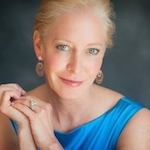
By Wendy Schmidt
I am an avid sailor, inspired not only by the visual beauty of the ocean and its vast power, but also by the practical (and potentially lifesaving) information that allows me to sail - the data on currents, winds and waves. It's the ocean we cannot see, but can measure. Sailors have relied on this information for centuries, and as technology has improved, our ability to gather it has also improved.
Gathering data near the ocean's surface, where we can see and feel it, is relatively straightforward. The real challenge is grasping what's going on under the surface, out of sight. We often hear about changes occurring in the ocean, such as warming, overfishing, pollution and ocean acidification. But how do we know exactly what's going on without dependable information?
Our understanding of the ocean is limited because there are numerous difficulties in collecting data. Primarily, it's often very expensive; researchers can pay $10,000 or more per day simply to travel to the place where they want to gather information. But beyond the expense, gathering data in the rough ocean environment can be time-consuming and physically difficult. For many reasons, water samples from different depths have to be collected and brought up to the surface for analysis in labs, and it can be difficult to preserve the integrity of these samples.
Competing pH sensors were lowered to a depth of 3,000 meters.
Part of the reason for creating the Wendy Schmidt Ocean Health XPRIZE was to address some of these challenges in gathering data about the ocean. I want to spur innovation in pH sensors because we need more information on ocean acidification in varying coastal environments and at depth. For the ocean, I want sensors that are accurate, durable, affordable and easy to use.
The Wendy Schmidt Ocean Health XPRIZE was launched in September 2013. The competing sensors were put through three progressively difficult tests: one in pristine lab conditions, one in coastal waters, and one in the deep ocean - down to 3,000 meters (or almost two miles below the ocean's surface where I sail). The finalist teams have developed pH sensors that can make measurements as accurate as water samples analyzed in a lab. Their sensors are affordable and durable, and have shown that they can withstand the high pressures of the deep ocean and operate for a month or longer in rugged coastal locations.
Today, as we celebrate this leap in our ability to gather more data on ocean acidification, I also celebrate that the technological innovations that came out of this competition could potentially be applied to other ocean sensors. We challenged our teams to develop sensors that go deeper and continue working in difficult environments. We challenged them to produce cheaper sensors. We challenged them to make it easier to collect data about the oceans so we can be better stewards.
In applying our technical expertise to the ocean, it's possible to get good quality data and more of it. Armed with that information, we will be better equipped to address the many other challenges the ocean is facing. We will be able to tell if there is a change, and the magnitude of that change. With more data, we will be able to understand, and with that understanding, we can help the oceans. And in helping the oceans, we will be helping the planet - and ourselves - to a healthier life, because it's all connected.
About Wendy Schmidt
Wendy Schmidt is President of The Schmidt Family Foundation, which works to advance the development of clean energy and support the wiser use of natural resources. She also is founder of the foundation's grant-making arm, The 11th Hour Project, and Climate Central, an independent organization of leading scientists and journalists researching and reporting the facts about our changing climate and its impact on the American public. With her husband, Eric Schmidt, Wendy created the Schmidt Ocean Institute in 2009, which provides opportunities for urgent ocean studies aboard the RV Falkor oceanographic research vessel. Wendy earned an M.J. in Journalism from the University of California, Berkeley and a B.A. magna cum laude from Smith College. She serves on the boards of The Natural Resources Defense Council, Climate Central, The Cradle to Cradle Products Innovation Institute, The Trust for Governors Island, XPRIZE Foundation, The 1851 Trust, Grist and Maiyet.
